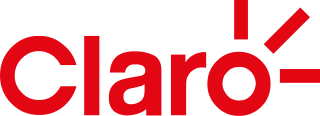Telecommunication in Honduras started in 1876 when the first telegraph was introduced, continued development with the telephone in 1891, radio in 1928, television in 1959, the Internet in the early 1990s, and cellphones in 1996.
Telecommunications in Puerto Rico includes radio, television, fixed and mobile telephones, and the Internet.

The telecommunication infrastructure of Singapore spans the entire city-state. Its development level is high, with close accessibility to the infrastructure from nearly all inhabited parts of the island and for all of the population, with exceptions. Today, the country is considered an international telecommunications hub, an achievement that was driven by Singapore's view that high-quality telecommunications is one of the critical factors that support its economic growth.
The New Progressive Party is a political party in Puerto Rico that advocates statehood. The PNP is one of the two major parties in Puerto Rico with significant political strength and currently holds both the seat of the governor and of the resident commissioner.

StarHub Limited, commonly known as StarHub, is a Singaporean multinational telecommunications conglomerate and one of the major telcos operating in the country. Founded in 1998, it is listed on the Singapore Exchange (SGX).
Innovate Corp. is an American public financial services company founded in 1994.

The Claro Company, or simply Claro, is a Latin American telecommunications company, part of América Móvil, a Mexican telecom group. Claro serves customers in Argentina, Brazil, Chile, Colombia, Costa Rica, the Dominican Republic, Ecuador, El Salvador, Guatemala, Honduras, Mexico, Nicaragua, Panama, Paraguay, Peru, Puerto Rico and Uruguay. Its Mexican operations are branded as Claro Mexico. The company's name means "bright," "clear," and also "of course," in both Portuguese and Spanish.

The Dr. Pedro Rosselló González Puerto Rico Convention Center (PRCC), or simply Puerto Rico Convention Center, is a convention center located in Isla Grande, in San Juan, Puerto Rico owned by the Puerto Rico Convention Center District Authority, a government agency of Puerto Rico, and managed by ASM Global. With a total space of 600,000-square-foot and designed by tvsdesign, it is the largest convention center in the Caribbean and one of the most technologically advanced in the Americas.
Centennial Communications and its subsidiaries provided wireless and broadband telecommunications services to wireless telephone subscribers in the United States, Puerto Rico, and the U.S. Virgin Islands. On March 13, 2007, Centennial Communications completed the sale of Centennial Dominicana to Trilogy International Partners for approximately $80 million in cash.

CANTV is the state-run telephone and internet service provider in Venezuela. It was one of the first telephone service enterprises in the country, founded in 1930. The largest telecommunications provider in Venezuela, it was privatized in 1991, and re-nationalized in 2007 by Hugo Chavez.

Claro Puerto Rico is the largest telecommunications service provider in Puerto Rico. It is headquartered in Guaynabo, Puerto Rico, and has operated for almost a century offering voice, data, long distance, broadband, directory publishing and wireless services for the island residents and businesses. It was founded by the Behn brothers, Sosthenes and Hernan in 1914. Originally, Puerto Rico Telephone Company eventually spawned ITT Corporation, which was founded by Sosthenes Behn. The company was a public corporation of the government of Puerto Rico for many years until the majority stakes were acquired by GTE in the mid-1990s. It was a subsidiary of Verizon Communications until it was fully acquired by América Móvil in 2007.

Eftel Limited was an internet service provider and telecommunications provider in Australia, with approximately 120,000 active accounts. It was established in 1999. Eftel offers a range of services including: DSL and dial-up Internet access, web hosting and telephony services - to the retail, corporate and wholesale telecommunications markets.
The Universal Service Fund (USF) is a system of telecommunications subsidies and fees managed by the United States Federal Communications Commission (FCC) to promote universal access to telecommunications services in the United States. The FCC established the fund in 1997 in compliance with the Telecommunications Act of 1996. Originally designed to subsidize telephone service, since 2011 the fund has expanded its goals to supporting broadband universal service. The Universal Service Fund's budget ranges from $5–8 billion per year depending on the needs of the telecommunications providers. These needs include the cost to maintain the hardware needed for their services and the services themselves. In 2022 disbursements totaled $7.4 billion, split across the USF's four main programs: $2.1 billion for the E-rate program, $4.2 billion for the high-cost program, $0.6 billion for the Lifeline program, and $0.5 billion for the rural health care program.

Axtel S.A.B. de C.V., known as Axtel, is a Mexican telecommunications company headquartered in San Pedro, near Monterrey. It offers telephone, internet, and television services through FTTH in 45 cities of Mexico as well as IT Services. It is the second largest landline telephone service provider and a relevant virtual private network operator.

Pedro Rafael Pierluisi Urrutia is a Puerto Rican politician and lawyer currently serving as governor of Puerto Rico since January 2, 2021. He has previously served as secretary of justice, resident commissioner, acting secretary of state, de facto governor of Puerto Rico and as private attorney for Puerto Rico's fiscal oversight board under the Puerto Rico Oversight, Management, and Economic Stability Act. He is a member of the New Progressive Party and the Democratic Party of the United States.

The Internet in the United States grew out of the ARPANET, a network sponsored by the Advanced Research Projects Agency of the U.S. Department of Defense during the 1960s. The Internet in the United States of America in turn provided the foundation for the worldwide Internet of today.
The Puerto Rico Statehood Students Association (PRSSA) —Spanish: Asociación de Estudiantes Estadistas de Puerto Rico— is a Puerto Rican non-profit student organization dedicated to promoting statehood for Puerto Rico. It was founded in 1979, and remained active for two years, becoming inactive 1981–1993, active again 1993 to 1997, inactive once more 1997 to 2007, when it was reactivated once again.

Primus Telecommunications Pty Ltd. is an Australian telecommunications company and wholly owned subsidiary of Vocus Communications that primarily focuses on fixed, mobile, and broadband services.

Liberty Communications of Puerto Rico LLC is a telecommunications company that provides broadband Internet access, VoIP, television and wireless services covering the entire island of Puerto Rico. The company is headquartered in San Juan and has over a million television subscribers and over 1 million data customers.
Amaury Rivera, the current chairman and CEO of Kinetics Systems Caribe, set up the two earliest competitors to the dominant Puerto Rico Telephone Company when the U.S. territory's telecommunication's market was opened to competition in 1996.











